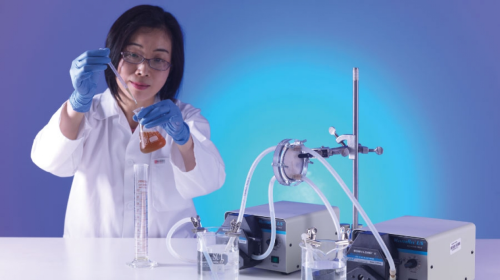
The research, led by Dr. Linda Zou, Professor of Civil Infrastructure and Environmental Engineering, focuses on the development of membranes made of graphene oxide sheets that are able to block the passage of salt ions in a membrane-based seawater desalination process.
Seawater desalination, a costly and energy-intensive process, produces more than 80% of the UAE’s freshwater. Efficient and sustainable technologies that will reduce its environmental and economic costs are a crticial need. One technology that may provide a solution is graphene-based membranes.
The graphene-based membranes developed in this work are made of multiple of layers of thin reduced graphene oxide sheets. The spacing between the sheets determines the membrane’s efficacy, or its ability to filter impurities like salt ions while still permitting water molecules to pass through. If the spaces between sheets are too large the salt ions are not filtered out, and if they too small even water molecules are unable to penetrate the membrane.
Being able to fine-tune the spacing size between layers is one of the most difficult challenges to developing efficient layered graphene membranes. Previous studies have shown that the optimal space between graphene sheets could be between 0.6 nm and 0.7 nm, therefore only a slight variation significantly affects the functionality of the membrane. Dr. Zou believes that her research provides a tool which will help scientists better fine-tune the size of inter-layer spacing.
The research team used atomic force microscopy (AFM) to probe the edges of each graphene sheet to obtain measurements of the exact height of the spaces between each sheet. They combined these measurements with statistical analysis to reveal the relationship between the amount of the chemical (reducing agent) used to make layered reduced graphene oxide membranes, and the resulting size of the spacing between each graphene layer.
The research is described in a paper published in the journal ACS Applied Materials and Interfaces.
Dr. Zou is also leading a collaborative research project with The University of Manchester, UK, that aims to incorporate graphene into membranes for electrically-driven membrane desalination strategies, such as electrodialysis and capacitive deionisation.
The Masdar Institute is a part of the Khalifa University of Science and Technology, Abu Dhabi.





